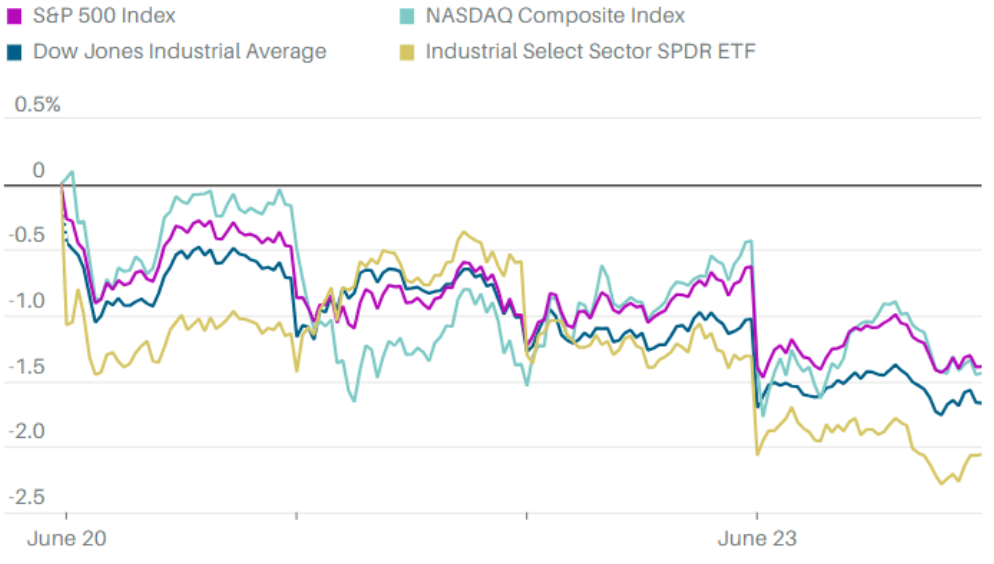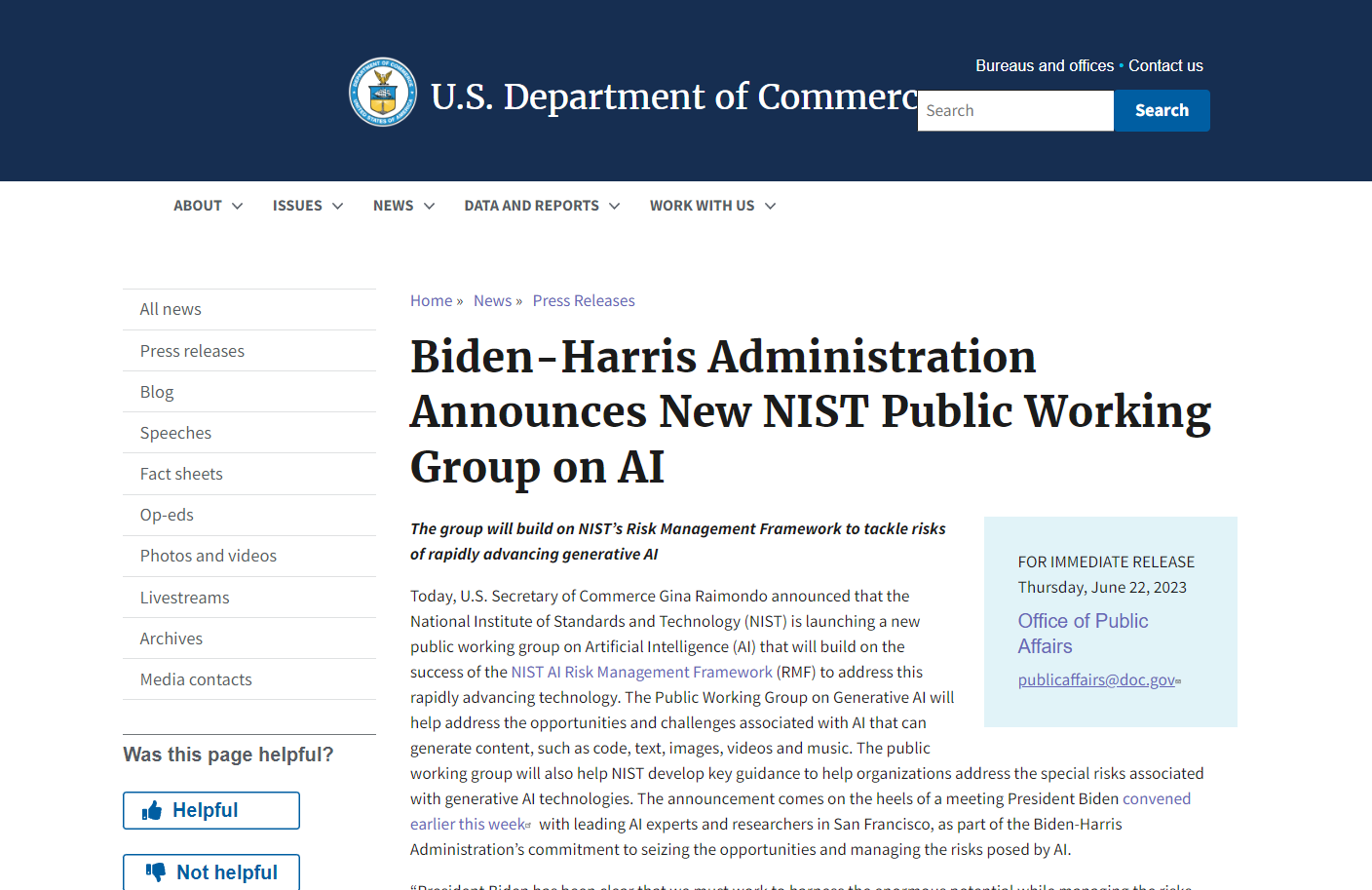Under the regulatory tide, investors began to withdraw from the momentum of the technology track.
As the United States accelerates regulatory deployment, it is foreseeable that the era of artificial intelligence "stocking" is coming to an end, and the era of "captivity" is coming.。
For this year's market, the Nikkei 225 index's triumph is a surprise, "stock god" with the entry of global investors are followed by a piece of meat.。A mountain is even higher, compared to the performance of U.S. technology stocks is more eye-catching。Among them, the S & P 500 index into the "technical bull market," the Nasdaq ushered in the Internet bubble era since the best half-year performance, Apple, Microsoft, Nvidia's share price is a record high.。

"The Great Rebound Before the Crash"
Last week, U.S. stocks were suddenly misfired: the S & P 500 closed down 1.4%, ending five straight weeks of gains; the Dow Jones Industrial Average fell 572 points, or 1.7%; the Nasdaq Composite Index fell 1.4%, ending eight straight weeks of gains。

The reason for this is that the technology sector, which underpins the performance of U.S. stocks, has recorded huge outflows over the past week。According to Bank of America's report, citing EPFR Global data analysis, the technology sector saw $2 billion in outflows in the five trading days ended June 21, the largest outflows in 10 weeks.。
In response, Bank of America strategist Hartnett (Michael Hartnett) said that after the stock market rose similar to the Internet bubble era in 1999, there are now initial signs that investors are fleeing technology stocks - the sector has just seen the largest outflow of funds in 10 weeks.。Earlier, he called the current artificial intelligence rally a "baby bubble," which he warned could be bursting.。
Hartnett noted that while crowded positions and high investor sentiment will not prevent the stock market from rising again, it is more likely that the stock market will fall than it will rise this summer。His team expects the S & P 500 to rise 100-150 points in the best case scenario and fall 300 points in the worst case scenario before Labor Day (September 4).。
To be sure, he added, investors are stuck in growth stocks such as technology because banks and commercial real estate still "have the potential for a severe recession, especially if the Fed raises interest rates again."。
In fact, this is not the first time Hartnett has warned about the "artificial intelligence bubble."。In his previous report, he stressed: "We don't believe that the stock market is at the beginning of a new bull market, and it feels more like 2000 and 2008, the big rally before the crash.。"
Artificial intelligence "stocking" era is coming to an end
Investors are pulling out of the U.S. technology sector, and European and American regulators are coming to the fire.。
Because artificial intelligence technology requires a large amount of data to train and learn, and the current access to databases is relatively limited, many of the privacy that should belong to individuals is violated.。In addition, AI technology may also be used to monitor and track the behavior and activities of individuals, which will further violate personal information.。
In the middle of this month, the European Parliament, a pioneer in artificial intelligence regulation, was the first to vote to ban the use of real-time remote biometrics.。The move is significant, meaning that in the future no institution or individual will be allowed to scan faces in real time in public.。The vote also stipulates that AI giants such as Open AI and Google need to evaluate tools such as GPT-4 and summarize the copyrighted material used to train their models.。
EU regulation of AI has been on the way。As early as April 2018, the EU was the first to issue a policy document "EU Artificial Intelligence," proposing to gradually establish an appropriate ethical and legal framework。In 2021, the European Commission introduced the world's first legal framework on artificial intelligence - the EU Artificial Intelligence Act。
Recently, the high-profile EU Artificial Intelligence Regulation Act (EU AI Act) is also moving towards the final stage, as the world's first attempt to fully regulate artificial intelligence technology, the introduction of the bill may become a "global standard" in the next few years.。
The United States, as a major town in the field of artificial intelligence, is not far behind at the regulatory level, and has recently proposed new initiatives。On June 22, US Secretary of CommerceRaimundo (Gina Raimondo) Announced that the National Institute of Standards and Technology (NIST) will establish a new artificial intelligence public working group, which will build on the success of NIST's artificial intelligence risk management framework to further address the rapid development of AI technology.。

In its official press release, the Commerce Department said the task force will recruit volunteers and technical experts from the private and public sectors, and will focus on the risks associated with generative AI, which is driving rapid changes in technology and markets.。
In addition, NIST has set short-, medium- and long-term goals for the working group.。In the short term, the working group will provide guidance on how to use NISF's AI risk management framework to support generative AI R & D.。In the medium term, the working group will support NIST's work on testing, evaluation, and more related to generative AI.。In the longer term, the working group will explore the potential for effective use of generative AI to address societal issues such as health, the environment and climate change.。
"President Biden has made it clear that we must work to harness the enormous potential of AI while regulating the risks it poses to our economy, our national security and our society."。"
It is reported that a few days ago, US President Biden (Joseph Biden) has met in San Francisco with the authority of artificial intelligence to listen to experts on the technology.。The outside world believes that the move or a sign that the Biden administration will speed up the regulation of artificial intelligence technology。
Biden pointed out at the press conference that artificial intelligence technology brings great prospects, but also brings great risks。He also said that in his State of the Union address, he would recommend that Congress pass bipartisan legislation to impose strict restrictions on the collection of personal data, advertising against children, and require artificial intelligence companies to make "health and safety" issues a priority.。
As major economies such as Europe and the United States accelerate the regulatory deployment of this technology, it is foreseeable that the era of artificial intelligence "stocking" is coming to an end and the era of "captivity" is coming.。
·Original
Disclaimer: The views in this article are from the original Creator and do not represent the views or position of Hawk Insight. The content of the article is for reference, communication and learning only, and does not constitute investment advice. If it involves copyright issues, please contact us for deletion.